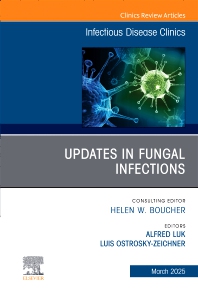Books in Infectious diseases
Books in Infectious diseases

Clostridioides Difficile Infection, An Issue of Infectious Disease Clinics of North America
- 1st Edition
- Volume 39-4
- Vincent B. Young
- English

Musculoskeletal Infections, An Issue of Infectious Disease Clinics of North America
- 1st Edition
- Volume 39-3
- Laura Certain
- English

Mandell, Douglas, and Bennett's Principles and Practice of Infectious Diseases
2-Volume Set- 10th Edition
- Martin J. Blaser + 2 more
- English

Viral Outbreaks, Biosecurity, and Preparing for Mass Casualty Infectious Diseases Events
- 1st Edition
- Trish M. Perl + 1 more
- English

Updates on Covid-19, An Issue of Infectious Disease Clinics of North America
- 1st Edition
- Volume 39-2
- Rajesh T. Gandhi + 1 more
- English

Medical Microbiology
- 10th Edition
- Patrick R. Murray + 2 more
- English

Suivi thérapeutique pharmacologique
Pour la personnalisation des traitements médicamenteux- 1st Edition
- Françoise Goirand + 2 more
- French

Comprehensive Review of Infectious Diseases
- 2nd Edition
- Andrej Spec + 3 more
- English

Rationelle Diagnostik und Therapie in der Inneren Medizin - Infektiologie + E-Book
Leitlinien-basierte Empfehlungen für die Praxis- 1st Edition
- André Fuchs
- German

Updates in Fungal Infections, An Issue of Infectious Disease Clinics of North America
- 1st Edition
- Volume 39-1
- Alfred Luk + 1 more
- English